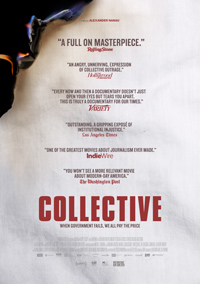The Fire Next Time: Nanau Finds Homegrown Corruption in Scandalous Expose
 The importance of actual investigation journalism is presented in all its full-blown glory with Collective, the fourth documentary from director Alexander Nanau. After a tragic fire in the nightclub Colectiv in Bucharest on October 30th, 2015 claims 27 lives and injures 180 more attendees, a tragic ripple effect of stunning institutional injustice is revealed across the government and healthcare systems of Romania, pursued and brought to light by a team of tenacious journalists working for news outlet Gazeta Sporturilor.
The importance of actual investigation journalism is presented in all its full-blown glory with Collective, the fourth documentary from director Alexander Nanau. After a tragic fire in the nightclub Colectiv in Bucharest on October 30th, 2015 claims 27 lives and injures 180 more attendees, a tragic ripple effect of stunning institutional injustice is revealed across the government and healthcare systems of Romania, pursued and brought to light by a team of tenacious journalists working for news outlet Gazeta Sporturilor.
A slice of deadpan despair reflecting significant disparities would cause such a significant outcry it (initially) toppled the Social Democrats in office. But Nanau presents sly, subtle parallels between the dilution of disinfectant and the expectations of political policy makers, as both the human body and the body politic experience cyclical deadly infections thanks to continual corruption.
Nanau, a director and cinematographer whose body of work showcases the grim realities of various social issues, shot his latest project over fourteen months as the national drama unfolded. The action kicks off well after the devastating nightclub fire as a full-scale investigation unfolds courtesy of the staff at a Bucharest sports newspaper. It appears survivors of the fire, even those with relatively minor burns, increasingly contracted bacterial infections after hospital treatment, killing many of them. Journalists follow nurses and doctors, hound officials with blunt questions, and the truth eventually rears its ugly, rather unfortunately mundane face. Not only were the hospitals woefully underequipped to deal with burn patients, across the board these facilities were using diluted disinfectants, causing a breeding ground for deadly, contagious bacteria. A tip leads the journalists to a stake out of Dan Condrea, the owner of Hexi Pharma. A test on the disinfectants proved them right, and paired with whistleblower physician Dr. Camelia Roiu, the scandal seemed to spark enough outrage to make a difference until a political election swung the pendulum back in the other direction.
The visual centerpiece of Collective is journalist Cătălin Tolontan, whose dry demeanor eventually evaporates in his persistence and dogged search for answers across various press briefings, which play like lip service, and sometimes breathless conversations of disbelief with various colleagues.
Nanau keeps the pace and the tone level-headed, never reducing the subject matter through the manipulation of a crashing, pulsing score (composer Kyan Bayani’s offering underlines rather than overwhelms) or shying away from the dry reality of facts. Nanau’s presentation feels strictly observational, a fly-on-the-wall approach to prickly meetings and interviews when vague approximations or outright falsehoods are offered in response to troubling questions. These are broken up with footage of survivors, such as Tedy Ursuleanu, participating in a photoshoot to become a symbol of the continually traumatic aftermath. The arrival of a new minister of health who prizes transparency, vocalizes his disgust on the rampant collusion between hospital administrators and the entirety of a medical establishment defined by corruption on every level and hierarchy. His presence seems to signal a chance at hope, a way to come out from under a scandal which finds Romania an embarrassment compared to their European counterparts.
As Collective comes to its pseudo conclusion, the Social Democrats rally, win another election, and formulate a propaganda counter-attack in the media. But even as the passage of time distances and blurs the reality of the nightclub fire and its disastrous ripple effects, the purpose and importance of Nanau’s documentary, a compendium of hard facts and furious emotion, reverberates in the brain. For there’s no amount of political posturing or eloquent representation of a bureaucracy to dispel the imagery of a hospital patient’s maggot infested wounds secretly photographed by an outraged physician.
★★★★/☆☆☆☆☆


